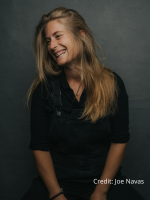On a sunny morning in early winter, Melissa Lynch hurries around a commercial kitchen in North Truro filling up bags.
"We have butternut squash, Delicata squash, golden beets, red beets. We have Bravo radishes, Dinado radishes, Eastham turnips. And still to go in, are pea shoots, a fresh herb kit, apples and garlic. This was a heavy, heavy produce bag."
Melissa works with Sustainable Cape, a non-profit dedicated to connecting local food to healthy places and people. Since April of 2024, she’s been running the organization’s Food is Medicine program, where Mass Health actually pays Sustainable Cape to deliver some of its patients’ local food:
"Patients in our program have to sort of check a few boxes," Melissa says. "They have to have a mental or physical health diagnosis, sometimes both. They have to be identified as being food insecure. And because we live in a food desert here in the Cape, this is, it's huge. A lot of families, you know, they'll have to make this bag stretch out for a week or more."
Most of the patients in the Food is Medicine program also suffer from chronic diet-related diseases. Currently Sustainable Cape is serving 55 families between Harwich and Provincetown, and the majority of patients suffer from cardiovascular disease — a condition that is not only prevalent here but is actually our top killer globally and is directly related to our diets.

"Food is the leading cause of death in this country, the lack of good nutritious food. So currently we’re running two tiers of the program. So there’s the fruit and veggie Rx, a child’s pediatrician will recommend that they have more fruit and vegetables in their diet. So they will push this quote unquote, prescription through to Mass Health and then they can get referred to us and enrolled in the program."
The fruit and veggie prescription program is for people of all ages, not just kids, but Melissa says pediatricians are the doctors who prescribe it most often. The rest of Sustainable Cape’s 55 patients receive what’s called a medically tailored food box. This means Melissa and a nutritionist on the team work together to figure out what foods will best address their patients’ needs — for example, a diabetes patient might get more kale and fewer apples or beets while someone who has cardiovascular disease might get chicken and fish instead of red meat — because then all participants in the program also get regular deliveries of local proteins.
"So they'll get mackerel, skate wing, uh turkey breast, bone broth, and then because we worked with Chatham Harvesters, we have this how to cook fish on the back. So several different styles and ways of cooking fish so people know what to do with the produce and the protein that we give them."
The idea is to support local farmers and fisherman while feeding the community. And in 2024, the Food is Medicine program spent $226,000 on local food over the course of 22 weeks. Melissa says the response from patients is exciting.
"You can tell people are feeling better, mentally and physically. We had one woman tell us that she was headed to palliative care not that long ago, and it's completely turned around," Melissa explained.
"She lost 20 pounds and she attributes it to having access to fruits and veggies, knowing how to cook them, what to do with them. I think people might be very unaware of how much need there is even in our own community, you know the need is dire, so I know we’re just sort of scraping the surface, but it’s a great start and the level of gratitude from our patients after they receive a delivery is immense."
—
Here is a link to the statewide coalition.








